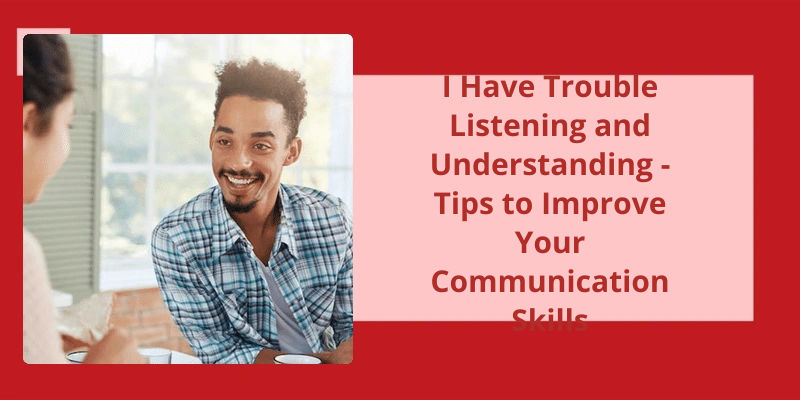Sharing information with your partner is crucial for maintaining a healthy and successful relationship. Withholding information from your spouse, especially those that are significant, can create a rift between the two of you, which can ultimately damage the foundation of your marriage. While it may be tempting to keep certain things to yourself, it’s important to consider the potential consequences of doing so. When you withhold information, you run the risk of losing your partner's trust, causing them to feel excluded or left in the dark.
Why Do Some People Withhold Information?
Some people may withhold information because they fear the reaction of the other person. They may be afraid that revealing certain information could lead to negative consequences or even harm the relationship. For example, a person may choose not to tell their partner about a past infidelity because they fear that it will end the relationship.
They may feel that sharing this information would reveal a weakness or flaw that could be used against them. This may be the case when it comes to personal struggles, such as mental health issues or financial difficulties.
Some people may also withhold information as a form of power and control. They may use this tactic to manipulate others and gain an advantage. This may be seen in situations where one person has more information than the other, such as in a workplace setting. By withholding information, they may be able to exert more influence over others.
They may not feel that the information is important or relevant to the other person. This may be the case when it comes to trivial details or inconsequential events. However, even seemingly insignificant information can have an impact on a relationship and it’s important to consider the potential consequences before choosing to withhold information.
How Can One Determine When It Is Appropriate to Withhold Information?
- Consider the potential harm that could result from disclosing the information.
- Weigh the benefits of keeping the information confidential against the potential harm of disclosing it.
- Determine if there are any legal or ethical obligations to disclose the information.
- Consider the potential impact on relationships and trust if the information is withheld.
- Assess whether withholding the information will affect the outcome of a particular situation.
- Consult with colleagues or experts to gain different perspectives on the situation.
- Make a decision based on sound reasoning and ethical considerations.
Communication is an integral part of any relationship, whether it’s romantic or not. Honesty and transparency build a strong foundation and trust between both partners. However, at times, people find it challenging to share certain information with their significant others. They believe that withholding certain things might avoid unnecessary conflicts, but it can lead to detrimental consequences in the long run. One such result could be the breakdown of the relationship. This article explores the question, “Is it okay to withhold information in a relationship?” and it’s potential consequences.
Is It Okay to Withhold Information in a Relationship?
Not only does it prevent the other person from fully understanding you, but it also damages the trust and intimacy that a relationship thrives on. Moreover, withholding information creates a power imbalance where one person has more control over the relationship than the other. When something is kept hidden, it festers and grows in the dark, causing more harm than good. The longer you wait to reveal the truth, the harder it will be for both of you to face it.
While honesty is always the best policy, there may be situations where sharing information could do more harm than good. For example, if your partner has a phobia of snakes and you come across one on a hike, theres no need to share that information and create unnecessary anxiety. However, if youre constantly withholding information about your thoughts, feelings, or actions, it will eventually take a toll on the relationship. Trust is built on transparency and vulnerability, and not being truthful erodes that trust over time.
It’s important to differentiate between privacy and secrecy in a relationship. Privacy is healthy and necessary for individuals to maintain their autonomy and boundaries. Secrecy, on the other hand, is a way of hiding information from your partner to protect yourself or avoid conflict. Secrecy is often rooted in fear or shame, and it rarely leads to positive outcomes in a relationship. It’s impossible to build a deep and meaningful connection with someone if youre constantly hiding parts of yourself.
If you find yourself withholding information from your partner, take a moment to reflect on why. Are you afraid of their reaction? Do you want to avoid conflict? Are you trying to protect yourself or them? Once you identify the root cause, have an open and honest conversation with your partner. Apologize for not being forthcoming and explain why youve been holding back. Be prepared for a range of emotions from your partner, but remember that being truthful is the first step towards healing and rebuilding trust.
Withholding information in a relationship isn’t okay in the long run. While there may be situations where privacy is necessary, hiding important information can damage the trust and intimacy that a relationship thrives on. True intimacy requires honesty and vulnerability, and withholding information prevents both of these from flourishing. Instead, strive to have open and honest communication with your partner, even if it feels uncomfortable or scary at first. Trust and intimacy are built through transparency and vulnerability, and the only way to achieve this is through honest communication.
The Difference Between Lying and Omitting Information in a Relationship
- Lying involves intentionally providing false information to someone in a relationship.
- Omitting information involves intentionally withholding information from someone in a relationship.
- Lying damages trust and can lead to a breakdown in the relationship.
- Omitting information can also damage trust and lead to misunderstandings, but may not always be intentional or malicious.
- Honesty and open communication are important in a healthy relationship.
Source: All The Little Things That Can Effectively Destroy Your …
It’s important to recognize that withholding is a particularly harmful form of emotional manipulation and psychological abuse. Whether it’s your partner, parent, friend, or co-worker, being subjected to this kind of treatment can leave you feeling powerless and controlled. In this article, we’ll take a closer look at the impact of withholding, how to recognize it in different contexts, and what you can do to protect yourself from it’s destructive effects.
What Does Withholding Mean Abuse?
Withholding can manifest in different ways such as emotional withholding or economic withholding. Emotional withholding is when a person withholds love and positive emotions as a way of controlling their partner. They may become distant, cold, or unresponsive when their partner needs emotional support or validation. Economic withholding, on the other hand, is when a person withholds financial resources or basic necessities like food, shelter, or clothing to control their partner. They may refuse to pay bills, provide money, or control access to bank accounts as a way to assert their power over their partner.
Withholding can have devastating effects on a persons emotional and mental wellbeing. It can trigger feelings of anxiety, depression, and low self-worth as a person begins to doubt their own value. They may feel like they aren’t enough and that they need to conform to their partners expectations to earn their love or support. This can lead to a cycle of codependency and emotional abuse where a person is trapped in a toxic relationship.
They may threaten to withdraw their love or support as a way to manipulate their partner into doing what they want. This can create a toxic dynamic where a person is forced to make decisions based on fear and not on their own needs or desires.
Overall, withholding is a form of abuse that shouldn’t be tolerated in any relationship. It erodes the trust and mutual respect that should form the foundation of a healthy partnership. If you or someone you know is experiencing withholding abuse, it’s important to seek help and support from a qualified professional. You deserve to feel safe, loved, and respected in all your relationships, and withholding should have no place in that.
Withholding information is often considered unethical and can have serious consequences. Whether it’s in personal relationships or legal situations, holding back important details can lead to misunderstandings, broken trust, and even legal repercussions. Therefore, it’s important to understand why people choose to withhold information and how to navigate these situations effectively.
What Does It Mean to Withhold Information?
In any professional setting, withholding information is considered a serious offense. It can have grave consequences for individuals and for organizations. It can cause false assumptions to be made, misunderstood facts, and inaccurate conclusions to be reached. In such situations, transparency is the key to building trust and maintaining good working relationships.
However, there may be situations when withholding information is the right thing to do. For example, a person may choose not to share their diagnosis with friends and family until they’ve had time to process the information themselves. Although not sharing information may seem dishonest, sometimes it’s necessary to protect oneself or others.
When an individual is uncertain about whether or not to divulge information, it’s important to consider the impact their decision may have on others and on themselves. Medical professionals, for example, have to make difficult decisions about what information to share with patients, especially when it comes to prognosis and end-of-life care. It’s important to make these decisions based on clear ethical and moral principles.
While there are situations in which it may be necessary to withhold information to protect oneself or others, it’s generally best to err on the side of transparency. Open communication and honesty are essential in building trust and maintaining strong relationships. Without these key principles, the consequences can be devastating.
The Consequences of Withholding Information in the Workplace, Including Legal and Ethical Considerations.
This topic discusses the potential negative outcomes that can result from purposely keeping information from colleagues or superiors in the workplace. It also delves into the legal and ethical implications of withholding information.
These ethical concerns regarding withholding information raise an important question: is withholding information deceit? While some may argue that withholding information is necessary for the research process, others believe that incomplete disclosure is a form of deception that can harm participants and undermine the integrity of the study. In this article, we will explore the ethical implications of incomplete disclosure in research and it’s potential impact on participants.
Is Withholding Information Deceit?
In the realm of human communication, withholding information can be seen as a form of deceit. When someone chooses not to reveal something important, it can create a sense of mistrust or even betrayal. Incomplete disclosure is a type of deception that’s often used in research studies and scientific experiments. It involves withholding certain information about the true purpose of the study or the nature of the research procedures.
While some researchers may argue that incomplete disclosure is necessary in order to obtain accurate and unbiased results, others argue that it’s ethically unacceptable. Those who oppose incomplete disclosure argue that withholding information from study participants violates their right to fully informed consent. If participants aren’t given all of the relevant information, they may be coerced or misled into participating in studies that they’d not have otherwise agreed to.
Furthermore, incomplete disclosure can lead to negative consequences for study participants. If researchers fail to disclose potential risks or side effects associated with a particular study, participants may unknowingly put themselves in harms way. This can lead to a breach of trust between researchers and participants, as well as negative public perception of scientific research as a whole.
The Role of Transparency in Interpersonal Relationships and How Withholding Information Can Impact Trust and Intimacy.
Transparency is important in relationships as it fosters trust and intimacy. Withholding information can negatively impact relationships as it diminishes trust and may create distance.
Conclusion
Trust is the foundation of a successful partnership and it can’t be attained if one partner is consistently keeping things from the other. Honesty and transparency are crucial in any healthy marriage, and both partners should make a conscious effort to openly communicate with one another. By doing so, couples can build a deeper connection rooted in mutual trust and respect. Ultimately, a successful relationship requires both partners to be committed to sharing their thoughts, feelings, and life experiences.






